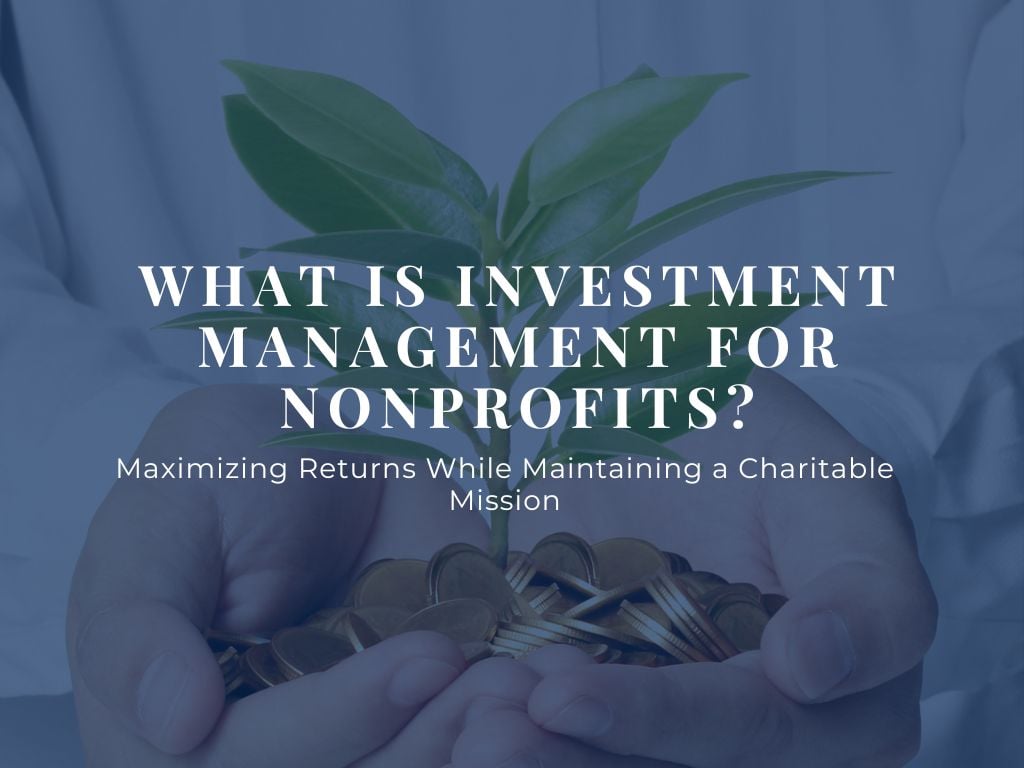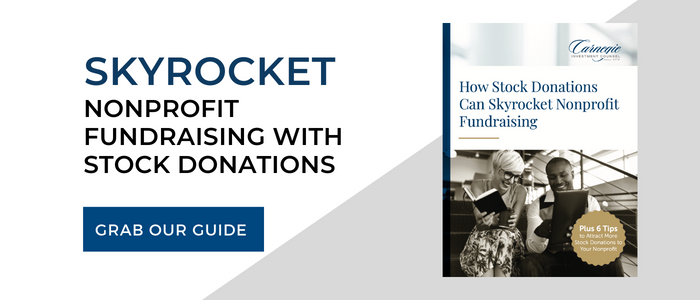
Are you a nonprofit looking to increase your funds and generate additional revenue? Investing or creating an endowment may be something you’ve considered, but you may not know where to start. If you’re asking “what is investment management for nonprofits?” it’s smart to learn more about maximizing your returns while maintaining your charitable mission. In this article, we dive into if nonprofits can invest, why effective nonprofit investment management is important and we offer four tips to help you manage your organization’s funds.
Can Nonprofits Invest in Stocks?
Yes, nonprofit organizations can invest in stocks as a way to potentially grow their endowment over time. Even small nonprofits can benefit from investments.
However, nonprofits must adhere to restrictions and regulations that individual investors do not. These vary based on your location and type of organization, so it is best to consult your nonprofit investment advisor or legal team to ensure you remain compliant with the correct standards.
What Is Effective Investment Management for Nonprofits Important?
One of the most important responsibilities of a nonprofit board member is to ensure the financial well-being of the organization they serve. As trustees of the organization's assets, it is their duty to exercise due diligence and unbiased oversight to maintain the financial integrity of the nonprofit.To fulfill their duty of care, board members must manage all assets of the organization, including investments, responsibly and prudently. After all, the goal of investing the organization’s assets is to create more funding to serve the mission.
To keep your organization’s tax-exempt status, it is crucial to comply with all local, state and federal laws and regulations. Therefore, it is best to consult with nonprofit investment advisors or legal teams to ensure compliance with the correct standards. You may risk losing your nonprofit status or tainting your reputation if found non-compliant.
Moreover, nonprofit organizations should consider aligning their investments with their values and mission. For example, if a nonprofit fights for human rights, it might want to avoid investing in and profiting from companies with known violations or bad reputations in this area. Having full oversight with your investments can help your nonprofit leaders ensure they are investing in alignment with their mission and values.
Tips for Effective Investment Management for Nonprofits
Investing can be a complicated process, and nonprofit organizations face unique challenges. Effective investment management is crucial for nonprofits to sustain their operations, support their mission and grow their impact. Whether your nonprofit is just starting to develop an investment policy statement or is well-established in managing its investments, here are some tips for effective investment management to achieve your financial goals while staying true to your mission.
Work With a Registered Investment Adviser (RIA)
By working with a Registered Investment Advisor (RIA), your organization will be served by the fiduciary standard, a duty of loyalty and care. RIA firms are regulated by the U.S. Securities and Exchange Commission and are legally responsible for placing the best interest of the client first for the lifetime of the relationship.
In addition, RIAs will seek to eliminate or disclose any potential conflicts. Portfolio managers employed by an RIA are held to these elevated standards when serving investors. We believe the RIA firm structure is best suited for nonprofit organizations. You are responsible for prudently overseeing, nurturing and growing your organization’s funds, and you can trust that an RIA has your best interest at heart.
This differs from other types of financial institutions and professionals, who are only obligated to make recommendations that are in their clients’ best interest needs at the time of the recommendation. This means they can offer financial advice that just barely meets a client’s needs but also earns commissions or higher fees for themselves. In addition, other advisor types or brokers/dealers do not have to be transparent with their fees.
If you thought that every financial advisor was held to the same standards, think again. Only an RIA has the fiduciary duty to act in their client’s best interests, provide objective investment advice and offer the lowest-cost products that fit the needs.
At Carnegie Investment Counsel, our CFP ®, CFA ®, and AIF® designated advisors are always looking out for the best interest of your organization. You can feel comforted knowing they are upholding the highest standards of care for investment advisors. We can help nonprofits with investment strategy development that aligns with their mission, asset allocation, risk management, policy creation, and monitoring and reporting on investment performance.
To ensure effective management and oversight, nonprofits should have the right policies and procedures in place. This includes the Investment Policy Statement (IPS), which outlines your organization’s investment goals, risk tolerance and guidelines for investing in various asset classes. It can include:
- Objectives.
- Risk tolerance.
- Asset allocation guidelines.
- Spending rates.
- Securities requirements and/or restrictions.
- Cash and liquidity requirements (short- and long-term).
- The systems to monitor and maintain investments in accordance with the IPS.
Foundations that come to us for our nonprofit financial advisory services are in different stages of creating and using an IPS. Some have very formal plans, while others are still forming them.
Carnegie can work with organizations to craft investment policy statements at any phase of their journey. For example, a newer foundation focused on education began working with us while in the phase of formation. Our Chief Investment Officer, Richard Alt, sat down with them and drafted an IPS to set parameters and formalize the plan to invest funds.
By having the right policies and procedures in place, nonprofits can ensure they are managing their investments effectively and in compliance with all applicable laws and regulations.
Create an Investment Strategy That Is Consistent With Your Mission and Values
Nonprofits exist to serve a specific mission, and their investment strategies may wish to align with that mission. For example, if your nonprofit is focused on environmental conservation, your investment strategy might not include investing in companies that engage in harmful practices that damage the environment.
Every nonprofit is unique, so no two investment strategies will look the same. A nonprofit investment advisor can help you develop an appropriate investment policy. You can even incorporate impact investing, which is an investment strategy with the goal of generating specific beneficial social or environmental effects in addition to financial gains.
Familiarize Yourself With UPMIFA
The Uniform Prudent Management of Institutional Funds Act (UPMIFA) is an act that governs the management of institutional funds donated to charitable institutions. It was designed to protect the assets of nonprofit organizations by ensuring that they are managed in a prudent manner, as well as to improve transparency and accountability in financial reporting. The goal of UPMIFA is to protect the assets of nonprofit institutions from misuse and loss by providing guidance to leadership.
This act is adopted individually by states, so regulations vary by location. It’s important for nonprofit board members to understand how UPMIFA affects their nonprofit and what their responsibilities are as leaders. You can learn more about UPMIFA by reading our article.
Still Wondering “What Is Investment Management for Nonprofits?”
It’s natural for nonprofit leaders to have questions about investing in stocks, starting an endowment or other financial matters. Don't let your nonprofit's finances hold you back from positively impacting your community. Book a meeting with Carnegie Investment Counsel today and find out how our expertise as an SEC Registered Investment Advisor can help increase the likelihood of your organization's financial success.
Looking for a Financial Advisor for Your Nonprofit?
Contact us if you are currently looking for a second opinion or help with investment management. We are happy to schedule an introductory meeting at your convenience.



